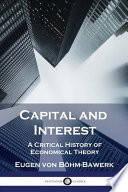 | Aristotle - Athens (Greece) - 1885 - 588 pages
...hated sort, and with the greatest reason, is usury, which makes a gain out of money itself, Usury the 5 and not from the natural use of it. For money was...intended to be used in exchange, but not to increase at moneyinterest. And this term usury [rcfcos], which means the birth of money from money, is applied... | |
 | Aristotle, Benjamin Jowett - Political science - 1885 - 468 pages
...hated sort, and with the greatest reason, is usury, which makes a gain out of money itself, Usury the 5 and not from the natural use of it. For money was...intended to be used in exchange, but not to increase at moneyinterest. And this term usury [roKoS], which means the birth of money from money, is applied to... | |
 | Eugen von Böhm-Bawerk - Capital - 1890 - 488 pages
...from one another. The most hated sort, and with the greatest reason, is usury, which makes a gain out of money itself, and not from the natural use of it....but not to increase at interest. And this term Usury (TOKO?), which means the birth of money from money, is applied to the breeding of money, because the... | |
 | Richard Theodore Ely - Economics - 1893 - 826 pages
...interest, as at present. The opinion of many classical writers is illustrated by Aristotle's dictum that " money was intended to be used in exchange, but not to increase at interest." During the greater part of the middle ages the authority and teaching of the church was set definitely... | |
 | Alfred Tennyson Baron Tennyson - 1893 - 290 pages
...1890) : "From Aristotle onward, who laid down the principle that money was in itself unfruitful, that 'money was intended to be used in exchange, but not to increase in interest,' — from the Canon Law, according to which 'loan interest is simply an income which the... | |
 | Plato - Greek literature - 1899 - 514 pages
...from one another. The most hated sort, and with the greatest reason, is usury, which makes a gain out of money itself, and not from the natural use of it....but not to increase at interest. And this term usury [TO«OC], which means the birth of money from money, is applied to the breeding of money because the... | |
 | Benjamin Jowett - 1899 - 480 pages
...from one another. The most hated sort, and with the greatest reason, is usury, which makes a gain out of money itself, and not from the natural use of it....but not to increase at interest. And this term usury [TO/CO?], which means the birth of money from money, is applied to the breeding of money because the... | |
 | Richard Theodore Ely - Economics - 1908 - 746 pages
...interest, as at present. The opinion of many classical writers is illustrated by Aristotle's dictum that " money was intended to be used in exchange, but not to increase at interest." During the greater part of the middle ages the authority and teaching of the church was set definitely... | |
 | Richard Theodore Ely - Economics - 1910 - 730 pages
...interest, as at present. The opinion of many classical writers is illustrated by Aristotle's dictum that " money was intended to be used in exchange, but not to increase at interest." During the greater part of the middle ages the authority and teaching of the church was set definitely... | |
| |